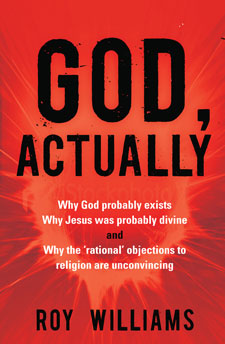Roy Williams has written a popular defence of his own Christian faith in the ABC book God, Actually. I have been surprised by the warm reception given to the book in our newspapers and now on reading it, I see why it has been so well approved by the press.
Williams, who lives in Sydney and was a lawyer for twenty years, re-investigated the Christian faith after becoming a father, doing much reading and experiencing serious depression. His book is a heartfelt appeal to agnostics and sceptics to re-think the Christian faith and it would be hard to miss his new appreciation for God and hard to criticise his desire to see people come to know God.
 The book is divided into three parts "” reasons to believe in God, reasons to believe in Christianity and answers to some common objections.
The book is divided into three parts "” reasons to believe in God, reasons to believe in Christianity and answers to some common objections.
The wealth of reading material is extraordinary and the quotes range backwards and forwards from Carson to Spong, from Martin Luther King to C.S.Lewis and from Herbert Butterfield to Williams' three special targets Dawkins, Hitchens and Harris "” the popular atheists leading people away from faith in God.
The reasons to "believe in God" are basically creation, conscience and love and Williams marshals some familiar and fresh insights "” not least an amazing deduction from the lunar eclipse of the sun! (pp 72"74). The reasons to "believe in Christianity" are Jesus and the resurrection and again the arguments are standard defenses "” all set out in a way that draws reasonable response without forcing a conclusion.
It's the third section ("answers to some common objections") where the arguments really get frustrating and the presuppositions behind the book really appear. I was sorry to see Williams' continued conviction that human free will is a given in God's plans and surprised to read of the Holy Spirit as an "it…the force which operates on and through my conscience" (p88). But by the time Williams has defended homosexuality and soft-pedalled abortion and then (effectively) endorsed salvation by works through any religion "” "I believe that it may be possible for a person who does not practise any religion or even to have heard of the Christian Church to achieve a state of grace that is acceptable to God" (p305) "” that Williams' true authority comes clear. As he says on p330, "my own belief…" (and goes on to re-think Hell) is what this book is really all about. And now we see why the secular press has approved the book so warmly because there is enough subjectivity here to leave everyone with permission (like Williams) to pick and choose their set of beliefs. In the end it"s his phrase "it seems to me" which summarises his authority and underrates any forcefully factual message.
At first I thought perhaps this is the work of a new convert but Williams has enough years as a Christian and enough books under his belt to know the Biblical arguments and whether to submit to them or not.
It may seem (typically?) picky to criticise a book that is out there in the bookstores getting secular Australians to re-think Christianity "” and I enjoyed much of this book. But there are two serious omissions: 1. An absence of understanding or interest in the cross, which is surely the most important issue to explain to unbelievers, and there is a strange leaning to live worthily of God (e.g. p126) and 2. There is little (if any) submission to Scripture unless it fits Williams' slogan "it seems to me".
This may be a "discussion starter' book but it won't provide an objective case for today's subjective unbelievers. I'm not planning to give it to sceptics or agnostics since it won't get them to face an objective God but will bring them to the thoughts of Roy, actually.






















